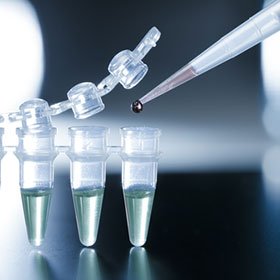EBiSC – the first European bank for induced pluripotent stem cells
Posted: 14 February 2014 | EBiSC | No comments yet
A consortium of 26 partners has been formed to establish the “European Bank for induced pluripotent Stem Cells” (EBiSC) with support from the IMI.


Pharmaceutical companies who are members of the European Federation of Pharmaceutical Industries and Associations (EFPIA) join forces with small and medium-sized enterprises (SMEs) and academia in an Innovative Medicines Initiative (IMI) supported public private partnership project to establish the leading facility for the storage and distribution of induced pluripotent stem (iPS) cells in Europe.
A consortium of 26 partners has been formed to establish the “European Bank for induced pluripotent Stem Cells” (EBiSC) with support from the IMI. The EBISC iPS cell bank will act as a central storage and distribution facility for human iPS cells, to be used by researchers across academia and industry in the study of disease and the development of new treatments for them. Conceptualized and coordinated by Pfizer Ltd in Cambridge, UK and managed by Roslin Cells Ltd in Edinburgh, the EBiSC bank aims to become the European ”go to” resource for high quality research grade human iPS cells . Today, iPS cells are being created in an increasing number of research programmes underway in Europe, but are not being systematically catalogued and distributed at the necessary scale to keep pace with their generation, nor to meet future demand. The €35 million project will support the initial build of a robust, reliable supply chain from the generation of customized cell lines, the specification to internationally accepted quality criteria and their distribution to any global qualified user, ensuring accessibility to consistent, high quality tools for new medicines development.
Ruth McKernan, CSO of Pfizer’s Neusentis research unit, said ‘We are excited to be a part of this precompetitive collaboration to build a sustainable repository of high quality human iPS cell lines. For many areas of research in academia and in industry, understanding the biological basis of disease heterogeneity is the next horizon. A bank of well-characterised iPS lines with strong relevance to the entire research community will help us all in our mission to bring therapies to patients.’
Since their discovery by Shinya Yamanaka in 2006, iPS cells have been recognised as a break-through technology which is leading to new approaches for the development of medical therapies and for the understanding of genetic diseases. iPS cells are produced in research laboratories by “reprogramming” cells provided by individual donors with appropriate consent, typically skin or certain blood cells. The iPS cells created will then replicate indefinitely or, under controlled conditions, can be “differentiated” into any other cell type such as nerve, heart or liver cells. Researchers are able to use these cells to test how different patients might respond to new drugs or to analyse how genetic diseases develop. iPS cells are particularly important for research on diseases for which it is not possible to obtain relevant tissue samples from living patients – such as neurodegenerative diseases including Alzheimer’s and Huntington’s Disease.
Numerous research programmes are currently underway in Europe to produce iPS cells from hundreds of different donors. Each programme has its own research goal, but as the iPS cells can be replicated to produce more cells than needed by the project, they could also be used by other researchers. However, the individual projects do not have the financial, technical or human resources to distribute cells to other researchers. This is the task which EBiSC is being established to
address.
Aidan Courtney, CEO of Roslin Cells said “The consortium includes many of Europe’s leading stem cell scientists and experts in related fields such as data management, law and social sciences. This breadth of expertise will allow EBiSC to establish rigorous methods to ensure that the cells distributed to researchers meet internationally recognised standards and also that their use is consistent with the consent of the tissue donor and the national laws of the country in which the iPS cells were originally generated. We will keep abreast of the fast moving progress in the field of how to make these cells and also provide an on-line resource to pool the results of research undertaken with the catalogue items that we distribute. In this way, EBiSC will create an ever increasing wealth of iPS cells, data and knowledge, which will help advancing drug development and health research.”
Project Partners
EFPIA companies
- Neusentis, a Research Unit of Pfizer Ltd, UK
- Novo Nordisk, Denmark
- AstraZeneca AB, Sweden
- H. Lundbeck A/S, Denmark
- Janssen Pharmaceutica NV, a Pharmaceutical Company of Johnson & Johnson, Belgium
- UCB Pharma SA, Belgium
SME’s
- Roslin Cells Ltd, UK
- ARTTIC, France
- DefiniGEN Ltd, UK
- Douglas Connect GmbH, Switzerland
- Bioneer A/S, Denmark
- European ScreeningPort, Germany
Universities, research organisations, public bodies, non-profit groups
- University of Edinburgh, UK
- Fraunhofer-Gesellschaft zur Förderung der angewandten Forschung e.V. (Fraunhofer-Institut für Biomedizinische Technik), Germany
- Genome Research Limited (Wellcome Trust Sanger Institute), UK
- European Molecular Biology Laboratory (European Bioinformatics Institute), Germany
- Charité University Medicine Berlin, Germany
- University of Newcastle Upon Tyne, UK
- Klinikum Der Universitaet Zu Koeln, Germany
- Gottfried Wilhelm Leibniz Universitaet Hannover, Germany
- Koninklijke Nederlandse Academie van Wetenschappen (The Hubrecht Institute), The Netherlands
- University College London, UK
- Universitaetsklinikum Bonn, LIFE & BRAIN Centre, Germany
- Culture Collections of PHE, UK
- National Institute for Biological Standards and Control, UK
- Instituto de Salud Carlos III. (Spanish Stem Cell Bank), Spain
Related topics
Stem Cells
Related conditions
Heart disease
Related organisations
EBISC, EFPIA, Innovative Medicines Initiative (IMI)


